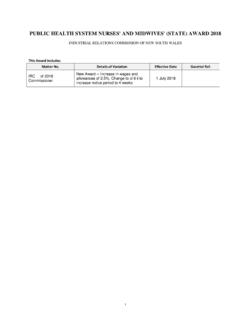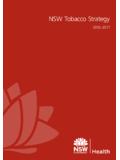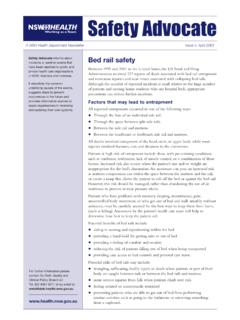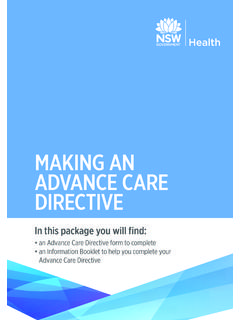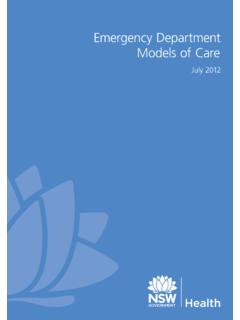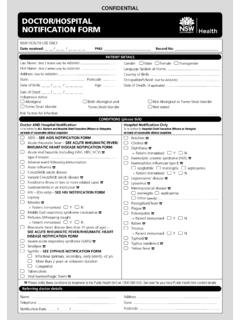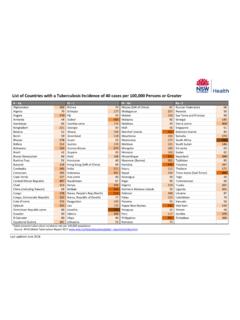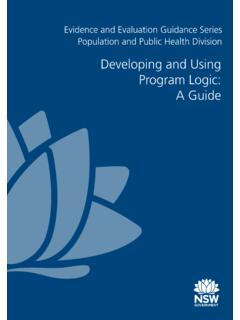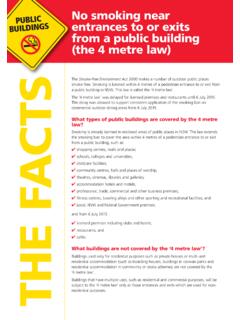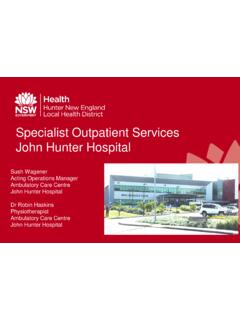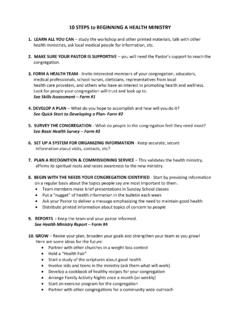Transcription of MENTAL HEALTH FOR EMERGENCY DEPARTMENTS
1 A REFERENCE GUIDEMENTAL HEALTH FOR EMERGENCY DEPARTMENTSNSW ministry OF HEALTH 73 Miller Street NORTH SYDNEY NSW 2060 Tel. (02) 9391 9000 Fax. (02) 9391 9101 TTY. (02) 9391 9900 citation: Suggested citation: MENTAL HEALTH and Drug and Alcohol Office, MENTAL HEALTH for EMERGENCY DEPARTMENTS A Reference Guide. NSW ministry of HEALTH . Amended March work is copyright. It may be reproduced in whole or in part for study or training purposes subject to the inclusion of an acknowledgement of the source. It may not be reproduced for commercial usage or sale. Reproduction for purposes other than those indicated above requires written permission from the NSW ministry of HEALTH .
2 NSW ministry of HEALTH 2015 SHPN (MHDAO) 150052 ISBN 978 1 76000 020 2 Further copies of this document can be downloaded from the NSW HEALTH website 2015 This Reference Guide is intended to assist EMERGENCY department staff and other clinicians in their care of people experiencing EMERGENCY MENTAL HEALTH is intended to support the wealth of experience and evolved practice that exists in EMERGENCY DEPARTMENTS and not to supplant nor replace local protocols and practice. It is meant to encourage, not replace, consultation with senior colleagues who remain the best source of information and advice.
3 Further, it is not a substitute for sound clinical Reference Guide builds upon the earlier versions of the reference guide (2001; 2002; 2009). It has been prepared through an extensive review process involving clinicians from the EMERGENCY medicine, MENTAL HEALTH and drug and alcohol fields, as well as consumers and Reference Guide represents the views of clinicians with extensive experience in the field, as well as the views of consumers and carers. It is based on the best clinical advice currently available, however it will require updating in the light of evolving evidence and changes to clinical best practice.
4 This is particularly the case with the more technical aspects such as medication you believe information contained in this publication is incorrect or open to misinterpretation, or if you have any general comments, please contact the MENTAL HEALTH and Drug and Alcohol Office at the NSW ministry of HEALTH , 73 Miller Street, North Sydney (telephone (02) 9391 9000). MENTAL HEALTH for EMERGENCY DEPARTMENTS A Reference Guide 2009 (Amended March 2015) 1 CONTENTS ACRONYMS ..21 INTRODUCTION ..3 Purpose of the guide ..3 Overview of the document organisation ..4 Triage the first step ..4 Essential clinical processes in EMERGENCY settings.
5 42 OVERARCHING ASPECTS ..6 Recovery-oriented practice ..6 Physical HEALTH care of MENTAL HEALTH consumers ..6 Major risks in MENTAL HEALTH EMERGENCY presentations ..6 Cultural considerations ..7 Family violence ..8 Duty of care ..8 Maintaining and sustaining the clinician ..83 TRIAGE OF POTENTIAL MENTAL HEALTH PRESENTATIONS ..9 MENTAL HEALTH triage scale ..9 Working collaboratively ..14 Involving other services ..164 INITIAL ASSESSMENT OF MENTAL HEALTH PRESENTATIONS ..17 Common MENTAL HEALTH presentations ..17 Safety assessment ..18 Confirmation of provisional diagnosis ..23 Special considerations.
6 245 COMMON SYMPTOMS AND PRESENTATIONS ..26 Self-harm/ suicidal behaviour or ideation ..26 Aggressive or threatening violence (agitated, angry) ..29 Confused or not making sense ..33 Odd or bizarre behaviour, ideas or speech ..35 Sad, depressed, withdrawn or distressed ..37 Hyperactive, loud, grandiose or elevated mood ..39 Nervous, anxious, panicky or excessively worried ..41 Substance-related and addictive disorders ..44 Eating disorders ..51 Physical symptoms in the absence of identifiable physical illness ..54 Repeated MENTAL HEALTH presentations ..55 Drug-seeking behaviour ..56 Chronic pain ..576 SPECIAL POPULATIONS.
7 58 Children and Adolescents ..58 Older Patients ..61 Other special needs groups ..637 ONGOING CARE AND MANAGEMENT OF THE PATIENT IN THE ED ..658 TRANSFER OF CARE: DISCHARGE TO THE COMMUNITY ..689 PSYCHIATRIC MEDICATION RELATED EMERGENCIES ..71 Acute dystonias ..71 Akathisia ..71 Serotonin syndrome/ toxicity ..72 Lithium toxicity ..72 Neuroleptic malignant syndrome (NMS) ..72 Agitation secondary to antidepressants ..732 MENTAL HEALTH for EMERGENCY DEPARTMENTS A Reference Guide 2009 (Amended March 2015)Agranulocytosis ..73 Cardiomyopathy/myocarditis ..73 Hyponatraemia ..73 Severe functional decline associated with psychotropic medication.
8 73 Hypertensive crisis secondary to monoamine oxidase inhibitors (MAOIS) ..7310 MANAGEMENT OF PATIENTS UNDER THE MENTAL HEALTH ACT 2007 (NSW) AND MENTAL HEALTH (FORENSIC PROVISIONS) ACT 1990 (NSW) ..7411 MANAGEMENT OF PATIENTS WITHIN THE MEMORANDUM OF UNDERSTANDING (MOU) 12 MANAGEMENT OF ACUTE SEVERE BEHAVIOURAL DISTURBANCE ..81 Assessment in a safe environment ..81De-escalation/distraction ..82 Legal issues ..83 Sedation ..83 Physical restraint ..90 Main points for mobilisation ..93 Calling for security or police assistance ..9513 CONTACT NUMBERS AND INTERNET RESOURCES ..96 APPENDICES ..101 Appendix 1: Charter for MENTAL HEALTH care in New South Wales.
9 102 Appendix 2: Suicide risk assessment and management for EMERGENCY DEPARTMENTS ..103 Appendix 3: Geriatric depression scale (GDS) ..115 Appendix 4: Cognition screening for older adults ..116 Appendix 5: Edinburgh Postnatal Depression 6: Slow-breathing exercise ..119 Appendix 7: Sleep hygiene ..120 Appendix 8: Guidelines for staff member providing 1 to 1 observation of the patient ..121 Appendix 10: Involuntary drug and alcohol treatment program: information for medical practitioners ..123 Appendix 11: NSW EMERGENCY Care Institute physical assessment form for MENTAL HEALTH patients ..126 Appendix 12: Mini MENTAL state examination form.
10 128 Appendix 13: Psychiatric terminology ..130 ACKNOWLEDGEMENTS ..136 ACRONYMS ACAT: Aged Care Assessment Team ASET: Aged Care Service EMERGENCY Team ATS: Australasian Triage Scale CAM: Confusion Assessment Method CAGE: (Alcohol Assessment Tool) Cut down; Annoyed; Guilty; Eye opener GDS: Geriatric Depression Scale PTSD: Post Traumatic Stress Disorder SAC: Safety; Assessment; Confirmation of Provisional Diagnosis SACCIT: Safety; Assessment; Confirmation of Provisional Diagnosis; Consultation; Immediate Treatment; Transfer of care SMHSOP: Specialist MENTAL HEALTH Service for Older People STARTTS: Service for the Treatment and Rehabilitation of Torture and Trauma Survivors MENTAL HEALTH for EMERGENCY DEPARTMENTS A Reference Guide 2009 (Amended March 2015) 3 CHAPTER 1 INTRODUCTIONThis document is a reference guide for clinicians working as first responders to MENTAL HEALTH presentations, particularly for EMERGENCY and acute presentations.
